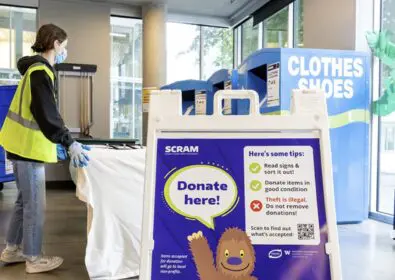As Northwest Center marks its 60th anniversary this year, we’re reflecting not only on our past but on the present challenges, many of which echo battles fought decades ago. We are proud to have helped birth special education in Washington State. It was here, in the Northwest, that parents, educators, and advocates first rallied to push for what would become laws and services ensuring opportunities for students with disabilities. Over six decades, those efforts have shaped lives, communities, and policy.
Now, that legacy is under pressure again.
What’s happening now: Federal staffing cuts that imperil IDEA enforcement
Recent news reports confirm what many in the special education field feared: the U.S. Department of Education is eliminating large numbers of staff, including in offices critical to monitoring and supporting special education.
- In the latest round of layoffs, roughly 466 employees were cut from the Department of Education, amounting to nearly 20% of its remaining workforce. AP News Article
- Among the hardest hits: the Office of Special Education Programs (OSEP), which helps administer and enforce the Individuals with Disabilities Education Act (IDEA). Reports indicate that only a handful of staffers may remain; some former insiders say that only the two most senior staff remain in OSEP and one in the Rehabilitation Services Administration. K-12 Dive Article
- With those cuts, vital supports, including monitoring, technical assistance, compliance oversight, grant administration, data collection, and complaint resolution are at real risk of falling silent.
- Some advocates argue these cuts effectively make IDEA’s legal protections “toothless” if there’s no one left at the federal level to enforce them. KJZZ PBS Article
In short: we may soon see a scenario in which states and local school districts are on their own to interpret and enforce federal special education law without oversight, technical support, or accountability from the federal government.
Why this matters deeply for students, families, and programs
- Uneven implementation and compliance. Under IDEA, states and districts must ensure that students with disabilities receive a “free appropriate public education” (FAPE) in the “least restrictive environment.” Without federal oversight, we risk widening disparity: some districts may continue to meet standards, others may not, and families can lose recourse.
- Loss of recourse and protections. When disputes arise, such as disagreements over whether a student’s IEP is adequate, families typically rely on complaint resolution or due process mechanisms, which often involve federal oversight. With fewer staff to process or investigate complaints, families could be left without a pathway to enforce their rights.
- Erosion of technical support. Many school systems, especially in underserved or rural areas, depend on guidance from the Department of Education to interpret new regulations, apply best practices, access resources, and manage grant programs. Without those supports, local systems may struggle to deliver equitable services.
- Programmatic stagnation. Without staff to manage grants, evaluate outcomes, provide training, or collect data, innovation and improvement in special education could stall.
- Cascading harm. These cuts don’t occur in a vacuum. They compound other pressures: local funding shortfalls, rising costs for special services (speech therapy, behavioral support, assistive technology), and a potential retrenchment by districts under budget strain.
Why Northwest Center’s 60-year mission is more urgent now
We carry forward the spirit and legacy of pioneering the special education movement in this region. The fights fought by parents and educators in the Northwest helped catalyze the adoption of IDEA and the structures that support inclusion, accommodations, early intervention, and lifelong opportunity.
But this is a moment in which past gains could be rolled back, or at least undermined. We now must not only preserve what we’ve built, but strengthen it, even as federal supports weaken.
What we can do together
- Engage your elected representatives.
- Contact your U.S. Senators and your U.S. Representative. Urge them to oppose further harmful cuts to the Department of Education and specifically to defend funding and staffing for the Office of Special Education Programs.
- Ask them to include robust oversight and safeguards for IDEA in any continuing resolution or appropriations bill.
- Encourage them to fund “maintenance of effort” requirements that prevent states from reducing their own commitments when federal dollars shrink.
- Support organizations that defend and deliver services.
- Your gift to Northwest Center helps sustain services, innovation, and advocacy in our region, buffering local impact even if federal capacity erodes.
- It allows us to continue training, technical support, legal guidance, and augment programs that might be squeezed.
- Raise public awareness.
- Share stories: when families, students, and educators speak up, it changes how policymakers perceive the real-world consequences of cuts.
- Use social media, local press, school board meetings, PTA forums, and community talks to highlight that these aren’t abstract policy debates. They affect daily access, equity, and opportunity.
- Monitor, document, and push back.
- If local districts reduce services, lengthen evaluation timelines, or struggle with compliance, document what’s happening. Share that data with state advocates, legislators, and media.
- Join or support state-level disability advocacy groups pressing for accountability.
A call to solidarity and remembrance
As Northwest Center is in its 60th year, we honor the boldness of families and activists who first demanded equitable education for all. Their work earned us legal guarantees we once lacked. Now, at a time when the federal scaffolding is shuddering, we must honor that legacy by stepping up. Not passively, but actively.
If you believe in the right of every child to belong, to learn, to thrive, then this is your moment to act.
- Make a gift to support our work. Your contribution helps buffer against disruption, support the families we serve, and amplify our advocacy voice.
- Reach out to your members of Congress. Tell them students with disabilities cannot be collateral damage in budget battles.
- Share widely. Use your voice, your networks, and your platforms.
Sixty years in, the mission is more vital than ever. Together, we can protect, preserve, and advance special education—not just for this generation, but for the next.




